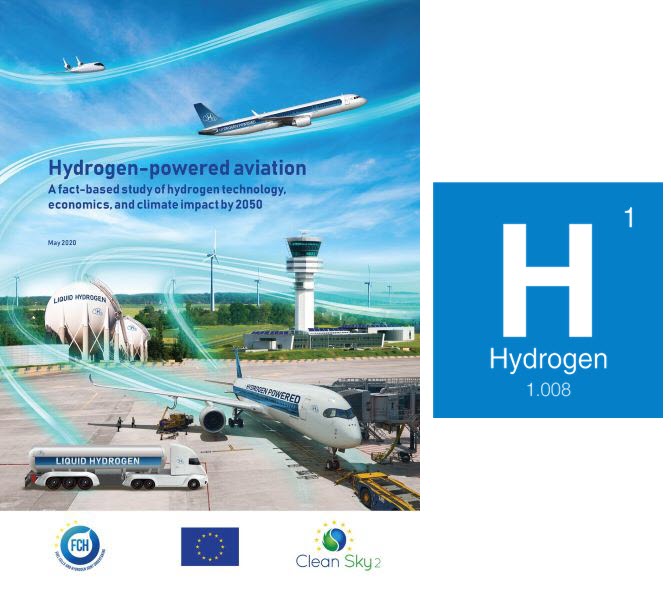
A new independent study, commissioned by Clean Sky 2 and Fuel Cells & Hydrogen 2 Joint Undertakings on hydrogen’s potential for use in aviation, was presented at an online event on 22 June which featured Adina-Ioana Vălean, the European Commissioner for Transport, and Patrick Child, Deputy Director-General of the Directorate-General for Research and Innovation at the European Commission, as keynote speakers.
In addition to leading industry representatives Stéphane Cueille (CTO, Safran), Glen Llewellyn (VP Zero Emissions Technology, Airbus), David Burns (VP Global Business Development, Linde), Per Ekdunge (Executive Vice-President, PowerCell) and Rolf Henke (Member of the Executive Board, German Aerospace Centre – DLR).
The study found that hydrogen – as a primary energy source for propulsion, either for fuel cells, direct burn in thermal (gas turbine) engines or as a building block for synthetic liquid fuels – could feasibly power aircraft with entry into service by 2035 for short-range aircraft. Costing less than €18 [$20] extra per person on a short-range flight, and reducing climate impact by 50 to 90%, hydrogen could play a central role in the future mix of aircraft and propulsion technologies.
“Hydrogen in aviation offers many opportunities for the transformation of our aviation sector. From production to distribution, to new aircraft designs and large scale use, it provides numerous opportunities for European companies to be at the forefront of our industrial revolution in the years to come,” says Adina-Ioana Vălean, European Commissioner for Transport.
“Research and innovation is vital to realize the full potential of hydrogen technologies for decarbonisation of aviation. The EU’s future Horizon Europe research and innovation framework programme is a fantastic opportunity to advance this agenda, working in partnership with industry and the research community. The excellent co-operation between the existing Joint Undertakings dedicated to Hydrogen Fuel Cells and Clean Aviation illustrates the need for close synergies between the two sectors as we work together on the ambitious objectives of the post-COVID recovery and the European Green Deal”, says Patrick Child, Deputy Director-General for Research & Innovation.
“Our ultimate goal is to achieve climate-neutral aviation by 2050. Turning this ambition into reality requires the seamless integration of a range of important new technological advancements, one of which is hydrogen-powered aircraft. This comes hand in hand with priorities such as hybrid engines, more electric aircraft, ultra-efficient short- and medium-range aircraft and lighter airframes. The mix of these various game-changing technologies will help us to reach our final destination,” says Axel Krein, Executive Director of Clean Sky 2 Joint Undertaking.
“The cost of producing clean hydrogen came down in recent years thanks to cheaper renewable electricity and bigger and cheaper production technology. At the same time, fuel cell performance in terms of durability, capacity and cost has made big steps forward. This combination has now made it possible to look to such solutions for decarbonisation of the aviation industry and the results of the study are clear on the huge potential of hydrogen in aviation. The hydrogen and fuel cell sector is ready to work hand in hand with the aviation industry to design, test and produce the required components and make zero-emission aviation an everyday reality,” says Bart Biebuyck, Executive Director of Fuel Cells & Hydrogen 2 Joint Undertaking.
Download the study on Fuel Cells and Hydrogen website and Clean Sky website.
For questions regarding the study, please contact [email protected]
Read the most up to date Fuel Cell and Hydrogen Industry news at FuelCellsWorks




